Since its founding in 1993, the European Union (EU) has undergone multiple rounds of enlargement, largely based on the idea that it would contribute to its stability, maintain peace and strengthen the EU’s role in global politics and the international market. But what are truly the main priorities of the European Union in undergoing such a long and bureaucratic process? Well, let’s find out.
Enlargement as a tool for stability and prosperity in Europe
Enlargement has proved to be a pivotal tool for fostering stability and prosperity in Europe as the EU expands its membership to include new countries. This strategy is based on the belief that a cooperative Europe leads to enhanced political stability, economic prosperity, and common security. Enlargement is instrumental in the expansion of the EU’s market, as well as the creation of opportunities for increased trade and economic cooperation. New member states gain access to the EU’s Single Market, promoting economic growth and facilitating the movement of goods, services and capital. Moreover, it attracts direct foreign investment and financial assistance, fostering the development of infrastructure, industry and innovation in candidate countries, something which contributes to the overall economic development of the region.
In terms of political stability, the EU’s enlargement process is inherently tied to the promotion of democratic principles, the rule of law and good governance. Aspiring member states are required to adhere to the Copenhagen criteria, which emphasize democratic institutions, human rights and the protection of minorities, while they are encouraged to engage in dialogue, address historical grievances, and build cooperative relationships with their neighbours. For example, the expansion of 2004 with the accession of ten countries (Cyprus, Czech Republic, Estonia, Hungary, Latvia, Lithuania, Malta, Poland, Slovakia, and Slovenia) marked the end of the Cold War divide, promoting stability in Central and Eastern Europe. It also brought about economic benefits and strengthened the EU’s influence on the global stage.
The Common Foreign and Security Policy is of great importance as well. It enhances the EU’s collective security by extending its influence and capabilities. A larger union has a greater capacity to address security challenges, such as organized crime, terrorism, and border issues, while it’s also more reliable than each country acting separately. At the same time, enlargement promotes cultural exchange and diversity within the EU.
The EU’s Current Enlargement Priorities
The EU strategically concentrates its enlargement policy on specific regions, notably the Western Balkans and Eastern Partnership countries, under the guidance of a multifaceted combination of geopolitical, economic, and strategic considerations. This deliberate focus underscores the EU’s unwavering commitment to fostering stability, cooperation, and integration throughout Europe.
The historical backdrop of the Western Balkans, marred by conflicts and instability following the dissolution of Yugoslavia, necessitates targeted attention. By concentrating efforts on this region, the EU aims to catalyse peace, reconciliation, and the prevention of potential conflicts. Simultaneously, the Eastern Partnership encompasses countries that were formerly part of the Soviet Union, and the EU’s emphasis on this area is a strategic response to the evolving geopolitical dynamics in Eastern Europe. It’s in the EU’s interest for the Balkans to be peaceful and prosperous, since membership would help the Western Balkans steer clear of Russian and Chinese influence. This approach seeks to nurture relationships with neighbouring nations and counteract undue influence from other geopolitical actors.
It was a war and the turbulent events in the Western Balkans during the 1990s in general which prompted European engagement and the offer of membership to the Western Balkans. This highlights how European enlargement is often driven by the need to address historical tensions and deep-rooted issues, promote meaningful dialogue, and act against the resurgence of conflicts. Stability, peace and enlargement are not necessarily the same but seem to be intertwined in the context of Balkan integration since it appears not to be primarily about the enlargement of the EU but dealing with the legacy of war.
This, of course, is not a straightforward process, especially when considering that in the more than two decades since the outbreak of the conflict, only Croatia has managed to join the EU. From this, it can be surmised that a country’s stability by itself may not be enough for entry into the EU, a fact that has made it increasingly difficult for integration to move forward.
Ukraine’s Application and Tension with the Western Balkans
An example similar to that of the Western Balkans’ recognition as candidate member-states following the war of Kosovo would be Ukraine’s application to join the EU shortly after the 2022 Russian invasion, in addition to Ukraine’s rapid acceptance into candidate status on behalf of the EU.
Until the Russian invasion, EU membership for Ukraine seemed improbable as the country remained far from meeting the Copenhagen Criteria. The war, however, changed the situation drastically, as just four days after Russia invaded the country, Ukraine applied to become a member of the EU. Joining the EU would be a monumental step for the Ukrainian state and would not only mean economic and political growth in addition to a higher standard of living but would also serve as a “rampart” against increasing Russian influence in Eastern Europe.
The aforementioned are the reasons for which Ukraine’s president, Volodymyr Zelenskyy, requested the application of a “special procedure”, meaning a faster acceptance of the country into the Union. This, however, is not possible, not only because such a procedure does not exist but also because it could potentially harm the relationship of the EU with the countries of the Western Balkans, who have maintained candidate status for over 20 years. Lastly, an additional factor behind the delay of Ukraine’s acceptance into the EU is the disagreement of Hungary’s Prime Minister Victor Orban, one of Russia’s greatest allies within the EU, who, until recently, shut down any conversations about Ukraine becoming a member of the Union.
Nonetheless, supporting Ukraine has been deemed an important policy to follow for most EU countries to a varying degree. Not only have they taken a number of political and economic measures against Russia, but the act of granting Ukraine a candidate status in such a short period of time is, by itself, telling of the EU’s stance. Not only does the EU show its support to a country under attack located close to its borders, but it also draws a clear line against Russia and its expansionist practices. By helping Ukraine and granting it the possibility of entry into the Union, the EU defends its peacekeeping role in Europe and maintains the values it claims to represent.
Coming to a conclusion
The EU’s targeted focus on the Western Balkans and the Eastern Partnership signifies a strategic commitment to stability, economic growth, and democratic consolidation in its immediate vicinity. The EU’s enlargement policy grounded in historical, geopolitical and economic considerations, aims to prevent conflicts, foster economic cooperation, and promote democratic values. By actively engaging with these regions, the EU seeks to encourage political reform, adherence to European norms, and contribute to the establishment and continuous prosperity of stable and well-governed societies. This approach, beyond a simple enlargement policy, envisions a united and cooperative Europe. As the EU navigates the complexities of enlargement, the importance of these regions remains central to shaping the future trajectory of European integration, promoting a cohesive and integrated European community.
- Bibliography
Cameron, F. (n.d.). The European Union and the Challenge of Enlargement. https://www.eliamep.gr/wp-content/uploads/en/2008/10/cameronop973.pdf
Stanicek, B. (2022). New EU strategy for enlargement. https://www.europarl.europa.eu/RegData/etudes/ATAG/2022/738205/EPRS_ATA(2022)738205_EN.pdf.
O’Brennan, J. (n.d.). EU enlargement to the Western Balkans: towards 2025 & beyond. https://acrobat.adobe.com/id/urn:aaid:sc:EU:6984014c-7e21-4e34-9319-df41f550ad4a.
Dimitrova, A. (2016). The EU’s Evolving Enlargement Strategies Does Tougher Conditionality Open the Door for Further Enlargement? Working PaPer SerieS. https://userpage.fu-berlin.de/kfgeu/maxcap/system/files/maxcap_wp_30.pdf
Panagiotou, R. (2012). The Impact of the Economic Crisis on the Western Balkans and their EU Accession Prospects. EUI-RSCAS Working Papers. https://ideas.repec.org/p/erp/euirsc/p0326.html
Jano, D. (1 C.E., January 1). EU Enlargement Rounds and Dilemmas: The Successful, the Reluctant, the Awkward, and the Laggards.Https://Services.igi-Global.com/Resolvedoi/Resolve.aspx?Doi=10.4018/978-1-7998-9055-3.Ch002. https://www.igi-global.com/gateway/chapter/full-text-html/295601
Schimmelfennig, F., & Ulrich Sedelmeier. (2005). The Politics of European Union Enlargement. Routledge.
European Union. (n.d.). EU enlargement – European Union. European-Union.europa.eu. https://european-union.europa.eu/principles-countries-history/eu-enlargement_en
European Council. (2017). EU enlargement. Europa.eu; European Council. https://www.consilium.europa.eu/en/policies/enlargement/
European Council. (2023, February 10). Ukraine. Www.consilium.europa.eu. https://www.consilium.europa.eu/en/policies/enlargement/ukraine/
European Council. (2023). EU response to Russia’s invasion of Ukraine. Www.consilium.europa.eu. https://www.consilium.europa.eu/en/policies/eu-response-ukraine-invasion/








